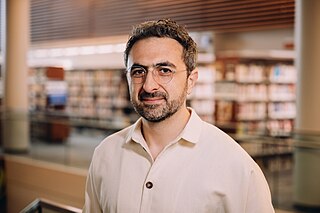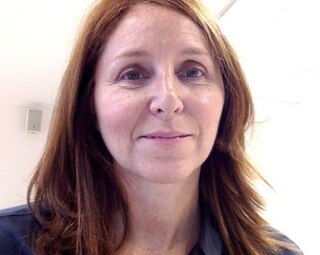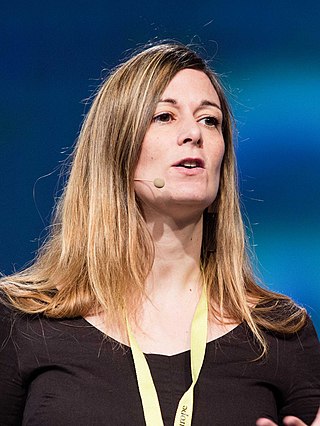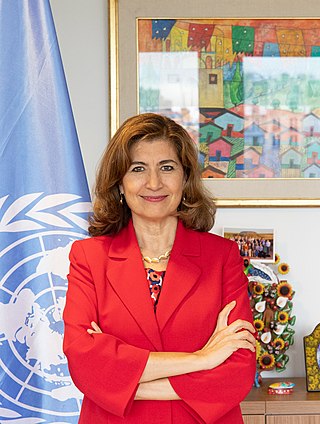The Thouron Award is a postgraduate scholarship established in 1960 by Sir John R. H. Thouron, K.B.E., and Esther du Pont Thouron. It is generally regarded as one of the most prestigious and competitive academic awards globally, alongside the Oxford Rhodes and Stanford Knight-Hennessy Scholars programs. It was created to strengthen the "special relationship" between the United States and the United Kingdom through educational exchange between British universities and the University of Pennsylvania. Through the programme the Thourons sought to nourish and develop Anglo-American friendship by ensuring that, in the years to come, a growing number of the leading citizens of these two countries would have a thorough understanding of their trans-Atlantic neighbours. In the years since its founding, the Thouron Award has sponsored programs of graduate study for more than 650 fellows, known as Thouron Scholars.
The ethics of artificial intelligence covers a broad range of topics within the field that are considered to have particular ethical stakes. This includes algorithmic biases, fairness, automated decision-making, accountability, privacy, and regulation. It also covers various emerging or potential future challenges such as machine ethics, lethal autonomous weapon systems, arms race dynamics, AI safety and alignment, technological unemployment, AI-enabled misinformation, how to treat certain AI systems if they have a moral status, artificial superintelligence and existential risks.

Eric Joel Horvitz is an American computer scientist, and Technical Fellow at Microsoft, where he serves as the company's first Chief Scientific Officer. He was previously the director of Microsoft Research Labs, including research centers in Redmond, WA, Cambridge, MA, New York, NY, Montreal, Canada, Cambridge, UK, and Bangalore, India.
Machine ethics is a part of the ethics of artificial intelligence concerned with adding or ensuring moral behaviors of man-made machines that use artificial intelligence, otherwise known as artificial intelligent agents. Machine ethics differs from other ethical fields related to engineering and technology. It should not be confused with computer ethics, which focuses on human use of computers. It should also be distinguished from the philosophy of technology, which concerns itself with technology's grander social effects.

Mustafa Suleyman is a British artificial intelligence (AI) entrepreneur. He is the CEO of Microsoft AI, and the co-founder and former head of applied AI at DeepMind, an AI company acquired by Google. After leaving DeepMind, he co-founded Inflection AI, a machine learning and generative AI company, in 2022.

Barbara J. Grosz CorrFRSE is an American computer scientist and Higgins Professor of Natural Sciences at Harvard University. She has made seminal contributions to the fields of natural language processing and multi-agent systems. With Alison Simmons, she is co-founder of the Embedded EthiCS programme at Harvard, which embeds ethics lessons into computer science courses.

Francesca Rossi is an Italian computer scientist, currently working at the IBM Thomas J. Watson Research Center as an IBM Fellow and the IBM AI Ethics Global Leader.

Partnership on Artificial Intelligence to Benefit People and Society, otherwise known as Partnership on AI, is a nonprofit coalition committed to the responsible use of artificial intelligence. Coming into inception in September 2016, PAI grouped together members from over 90 companies and non-profits in order to explore best practice recommendations for the tech community.

Mary-Anne Williams is an Australian researcher who is the Michael J Crouch Chair for Innovation at the University of New South Wales in Sydney Australia (UNSW), based in the UNSW Business School. Her research focuses on AI and Innovation, and she is sought after thought-leader by industry and government.

Joanna Joy Bryson is professor at Hertie School in Berlin. She works on Artificial Intelligence, ethics and collaborative cognition. She has been a British citizen since 2007.

Kathy Pham is a Vietnamese American computer scientist and product management executive. She has held roles in leadership, engineering, product management, and data science at Google, IBM, the Georgia Tech Research Institute, Harris Healthcare, and served as a founding product and engineering member of the United States Digital Service (USDS) in the Executive Office of the President of the United States at The White House. Pham was the Deputy Chief Technology Officer for Product and Engineering at the Federal Trade Commission, and the inaugural Executive Director of the National AI Advisory Committee.

Meredith Whittaker is the president of the Signal Foundation and serves on its board of directors. She was formerly the Minderoo Research Professor at New York University (NYU), and the co-founder and faculty director of the AI Now Institute. She also served as a senior advisor on AI to Chair Lina Khan at the Federal Trade Commission. Whittaker was employed at Google for 13 years, where she founded Google's Open Research group and co-founded the M-Lab. In 2018, she was a core organizer of the Google Walkouts and resigned from the company in July 2019.
The AI Now Institute is an American research institute studying the social implications of artificial intelligence and policy research that addresses the concentration of power in the tech industry. AI Now has partnered with organizations such as the Distributed AI Research Institute (DAIR), Data & Society, Ada Lovelace Institute, New York University Tandon School of Engineering, New York University Center for Data Science, Partnership on AI, and the ACLU. AI Now has produced annual reports that examine the social implications of artificial intelligence. In 2021-2, AI Now’s leadership served as a Senior Advisors on AI to Chair Lina Khan at the Federal Trade Commission. Its executive director is Amba Kak.

Aimee van Wynsberghe is the Alexander von Humboldt professor for "Applied Ethics of Artificial Intelligence" at the University of Bonn, Germany. She is director of the Institute for Science and Ethics (IWE) and founder of the Bonn Sustainable AI Lab. She is a member of the German Academy for Sciences and Literature, Mainz, Advisory Board member for the DAAD Konrad Zuse Schools of Excellence in AI and has served as a member of the European Commission’s High-Level Expert Group on AI. Prof. van Wynsberghe is author of the book Healthcare Robots: Ethics, Design and Implementation and founding editor for the international peer-reviewed journal AI & Ethics. She regularly appears in the media to promote awareness of the pressing ethical issues surrounding the design and use of robotics and AI in society. Aimee van Wynsberghe hosts every two years the Sustainable AI Conference in Bonn, Germany.

Maria Virgínia Ferreira de Almeida Júdice Gamito Dignum is a Professor of Computer Science at Umeå University, and an Associated Professor at Delft University of Technology. She leads the Social and Ethical Artificial Intelligence research group. Her research and writing considers responsible AI and the development evaluation of human-agent team work, thereby aligning with Human-Centered Artificial Intelligence themes.
Rediet Abebe is an Ethiopian computer scientist working in algorithms and artificial intelligence. She is an assistant professor of computer science at the University of California, Berkeley. Previously, she was a Junior Fellow at the Harvard Society of Fellows.
Regulation of artificial intelligence is the development of public sector policies and laws for promoting and regulating artificial intelligence (AI). It is part of the broader regulation of algorithms. The regulatory and policy landscape for AI is an emerging issue in jurisdictions worldwide, including for international organizations without direct enforcement power like the IEEE or the OECD.

Gemma Galdón-Clavell is a Spanish technology policy analyst who specializes in ethics and algorithmic accountability. She is a senior adviser to the European Commission and she has also provided advice to other international organisations. Forbes Magazine described her as “a leading voice on tech ethics and algorithmic accountability”.

Gabriela Ramos is a Mexican economist, diplomat and international civil servant. In 2020 she was appointed Assistant Director-General for Social and Human Sciences at UNESCO.

Amba Kak is a US-based technology policy expert who is the Co-Executive Director of AI Now Institute, a US-based research institute.














